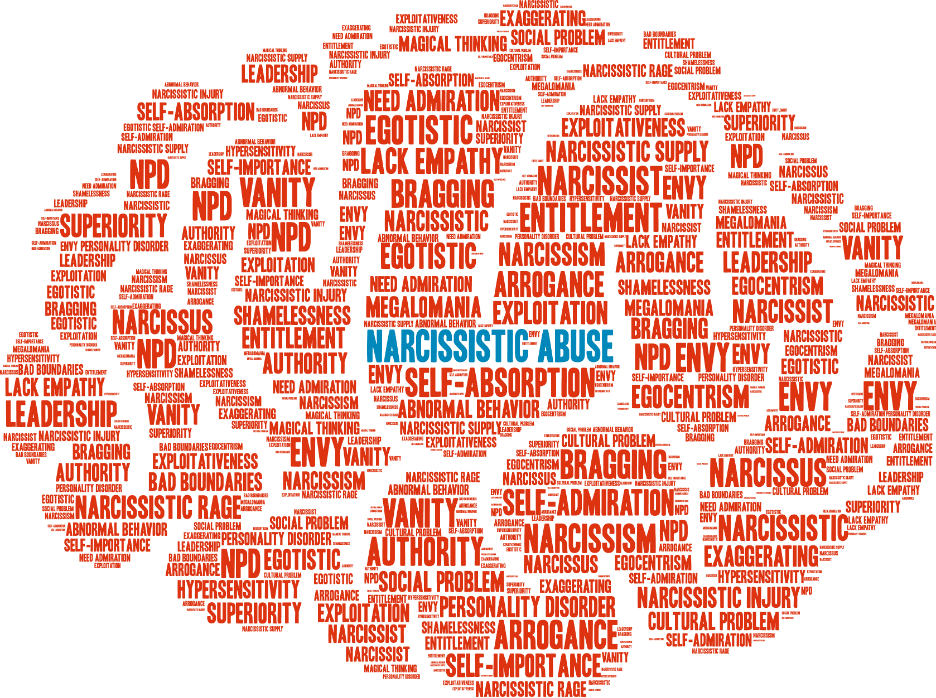Divorcing a Narcissist is Only Hard If You Are Unprepared
What is it like to divorce a narcissist? What should you expect? What strategies should you take when divorcing a narcissist in California? This comprehensive guide on divorcing a narcissist covers the most common questions and issues, providing answers for those who are divorcing or expecting to divorce a narcissist in this state.
This guide assumes you are wise enough to hire an experienced California family law attorney. You're making a mistake if you're reading this guide to represent yourself. Don't do it. No guide can replace the value of legal advice and effective representation.
There are thirteen parts to this Guide. Think of them like chapters to a book. Each part gives you a wealth of information you can use. You can click on the links below to jump ahead.
- Part One - What is a Narcissist?
- Part Two - Viewing Narcissism in a Divorce
- Part Three - The Idiosyncratic Narcissist Types
- Part Four - Do Not Overfocus on Your Spouse's Personality
- Part Five - Are You Victimizing Yourself?
- Part Six - What Does a Narcissist Really Want Out of a Divorce?
- Part Seven - Narcissist's Tactics Regarding Child Custody in a Divorce
- Part Eight - Narcissist's Tactics Regarding Child Support and Alimony in a Divorce
- Part Nine - Narcissist's Tactics Regarding Property Division, Debt Division and Attorney's Fees
- Part Ten - How to Divorce a Narcissist Without Going Broke or Losing Your Mind
- Part Eleven - Can You Really "Win" When Divorcing a Narcissist?
- Part Twelve - The Common Mistakes You and the Narcissist Will Make
- Part Thirteen - Selecting Your Divorce Attorney
Part One - What is a Narcissist?

The Diagnostic and Statistical Manual of Mental Disorders (DSM) probably isn't at the top of your reading list. It's also quite challenging to read unless you happen to enjoy browsing through the American Psychiatric Association's classifications and definitions of mental disorders.
But that's where we need to start to understand narcissistic personality disorder. We liked DSM-IV's definition better, so we will start there.
DSM-IV's Definition and Classification of Narcissistic Personality Disorder
The highlights from DSM-IV include the following:
Narcissistic personality disorder is characterized by a consistent pattern of "grandiosity," a "need for admiration," and a "lack of empathy." DSM-IV considers the following criteria, with five or more needed for a diagnosis:
- A "grandiose sense of self-importance," where this grandiosity is exaggerated and not earned;
- Preoccupation with "fantasies of unlimited success, power, brilliance, beauty, or ideal love;"
- A belief that they are special or unique, particularly in terms of status;
- A need for excessive admiration;
- A sense of entitlement, expecting favorable treatment or that others will cater to their expectations;
- Exploitative tendencies in relationships, taking advantage of others for selfish reasons;
- A lack of empathy;
- Envy of others and a belief that others are envious of them;
- A high level of arrogance, to the point of being, well, haughty.
If a person meets five or more of these criteria, DSM-IV may label them as a narcissist.
But does narcissism just mean someone is a "jerk"?
To some Americans, the term "narcissist" has become synonymous with being a jerk. Unfortunately, two unfortunate consequences arise if the word loses its meaning and becomes overused. First, people who are not narcissistic may be unfairly labeled as such. Second, those who are genuinely narcissistic might not recognize it and, therefore, may not receive the help they need.
Narcissism, by itself, is far more than simply being an occasional jerk or acting selfishly to an unreasonable degree from time to time.
Overusing the Narcissism Label
We do not advocate for overusing the term "narcissism." When a prospective client claims that their spouse is a narcissist, we want to understand why they believe that and why it might matter in the context of their divorce. As senior family law attorneys, we have professional experience litigating against narcissists in divorce and parentage cases. We believe we understand their style, tactics, and emotionally abusive behavior. That is why I wrote this guide.
However, it's important to note that this is not a diagnosis. Lawyers do not diagnose narcissism. Instead, those of us who are well-read on the subject, who study it, and who have foundational knowledge and experience of how to deal with it within a divorce or parentage case approach it from a practical standpoint. We care about how it affects the actions we take to mitigate the harm it may cause our clients, not in a clinical or academic sense.
Part Two - Viewing Narcissism in a Divorce

Since we are not therapists or psychologists and do not focus on diagnosis or treatment, we view narcissism as a significant obstacle to what should be a logical, reasonable, and amicable process. Narcissists rarely contribute to making any process logical, reasonable, or amicable. Instead, their delusions of grandeur and inability to consider perspectives other than their own may, if unchecked, lead to:
- Emotional spikes in their spouse;
- Unreasonable delays; and
- An unnecessarily expensive and stressful divorce process.
Through our experience handling divorces involving those we believed to be narcissists, we've developed the following insights about the narcissistic spouse.
Narcissists Are Often Megalomaniacs
Megalomania is characterized by an obsession with dominating others and an extreme desire for control, often exhibited through a nearly constant "power trip."
A narcissistic spouse may be a monster behind closed doors—emotionally abusive and overpowering in their attempts to dominate their spouse. This behavior can make life miserable for their spouse and children. However, place the narcissist in a social environment where they don't have prolonged exposure to others, and you may see a completely different person. It's a classic Dr. Jekyll and Mr. Hyde scenario.
Narcissists do not want to be seen as the bad person. If their significant personality disorder were to become widely known, they might be mortified. This all ties back to self-protection and self-preservation. Narcissists have an unhealthy view of self-importance, and external criticism from friends, co-workers, or others in social settings deeply strikes their egos.
I believe that narcissists can justify their emotionally abusive behavior and egomaniacal ways towards their spouse and children because, from their perspective, none of it is their fault. Why? Because, in the narcissist's mind, it's their spouse who refuses to recognize the narcissist's wisdom and correctness in thought or action. Due to the significant amount of time they spend with their spouse and children, narcissists can convince themselves of this delusion. However, it's much harder for a narcissist to maintain this delusion when the number of people who really get to know them increases. The result can be seismic and a significant blow to that highly inflated ego.
For this reason, a narcissist may appear to casual friends, acquaintances, or those they meet in social settings as charming, kind, and gracious—essentially the opposite of who they truly are at home. This disparity often leaves the victimized spouse feeling isolated during the divorce process, leading to conflicting emotions.
Narcissists Are Habitual Liars
If someone is an awful human being—highly emotionally abusive or worse within their household—yet portrays a different image to the outside world, do you think that person is often dishonest? The answer is yes. For these reasons, the worst narcissists are also the most habitual liars.
Habitual deception can take many forms, both big and small. Infidelity? Yes. Concealing finances or outright deception about the family's financial situation? Absolutely. One of the most challenging aspects of living with and being married to a narcissist is that, upon separation, you may begin to question whether anything your spouse told you was ever truthful. This realization can be emotionally devastating, as you may wonder if you lived a lie and wasted years—sometimes even decades—of your life with the narcissist.
Narcissists Are Obsessed with Controlling Their Spouse
For a narcissist, control is like a drug—they are addicted to it. The narcissist wants to control their spouse's actions. They would if they had the power to control the words from their spouse's mouth. Narcissists do not seek honest and respectful dialogue; they want control. Sometimes, they attempt to achieve this control by manipulating their spouse until the spouse either agrees with their twisted perspective or breaks down in exhaustion from the emotional bombardment.
Narcissists control those around them by lying, concealing information, badgering, and belittling them. Badgering and belittling are distinct actions: the badgering comes from insults, which can sometimes escalate to physical abuse, and the insults are not always limited to the spouse; they can extend to the spouse's family and even the children. Stay-at-home parents married to narcissists often feel worthless, useless, and like they are not contributing members of the household.
Narcissists Cannot See Their Spouse's Perspective
If their spouse's perspective is not the same as that of the narcissist, then the spouse's perspective is wrong, and the narcissist will not agree with it. Since the extreme narcissist will not admit to being wrong, any conflict with their perspective is unacceptable.
Did you notice how crazy that lack of logic is?
You might wonder, "How is that possible? How can they not even recognize there is another perspective?" I don't have the answer to that question because it would require getting into the mind of a particular narcissist. However, based on my experience with them, if they were honest with themselves, they might at least acknowledge the existence of another perspective. The problem is, when dealing with a narcissist who is extreme in their personality disorder, their delusions of grandeur are exactly that—delusions. They are so deluded in their own grandeur that any perspective offered in opposition is met with an immediate and innate filibuster that quashes further dialogue or consideration.
Narcissists Are Cowards Disguised as Bullies
This is often the most challenging realization for spouses dealing with a narcissistic partner. They see their spouse as wickedly controlling, and often, the narcissist's spouse feels beaten down and defeated. Their self-esteem plummets, and they begin to doubt their own decisions. Many times, they just want to surrender to whatever their narcissistic spouse demands just to avoid dealing with them.
But the reality is that the narcissist is a coward. The person who tries to emotionally beat down another is usually highly insecure in themselves and rarely, if ever, has the courage of their convictions. That's why, in many divorce cases, as long as the victimized spouse does not give up, they are able to defeat the narcissist. Narcissists will often fall apart and self-destruct. And when they don't, they can be defeated by correctly applying the law to the facts.
We will discuss this more later in the guide.
Part Three - The Idiosyncratic Narcissist Types

When our family law firm handles divorces, we don't just consider the potential personality type and then follow a one-size-fits-all approach. Within certain personality types, we often find idiosyncrasies that are important to recognize.
Below is a short list of idiosyncrasies we often see with narcissistic personalities. It is important to identify these idiosyncrasies because they help us plan strategies for the case.
The Overly Frugal, "Cheap" Narcissist
This type of narcissist is often characterized by delusions of grandeur mixed with an obsessive need to control finances.
In divorces involving this type of narcissist, we often see the following behaviors:
- A refusal to physically separate: This type of narcissist usually refuses to move out of the home, insisting on continuing to live there regardless of how stressful the environment becomes.
- A refusal to agree to any reasonable child support or alimony amount: If the narcissistic spouse is the higher earner, they usually justify their refusal by claiming, "I cannot afford it," without regard to the needs of their spouse or children. This narcissist becomes so oblivious to the financial realities of divorce that they ignore California's laws regarding these issues.
- A refusal to pay support: Typically, this personality type is the higher-earning spouse who controls the finances. In extreme cases, we see the narcissistic spouse refuse to honor their support obligations even after a court order.
- A refusal to accept community and separate property characterizations per California law: When it comes to property division, these spouses sometimes convince themselves that no one can force them to divide the assets and debts. They persist with their stubbornly unreasonable perspectives, leading to an inability to resolve property issues. Even simple property matters may proceed to a hearing or trial. In extreme cases, I've seen narcissistic spouses make ridiculous claims, completely unsupported by the facts and the law, just to delay the process or push it to trial based on their delusional belief that their claims should somehow prevail.
The Attention-Seeking Narcissist
This type of narcissist combines delusions of grandeur with deep insecurities, which either manifest as a fake victim role or as a histrionic and hyper-emotional personality.
The behaviors we often see from attention-seeking narcissists include:
- False allegations of abuse: These narcissists are prone to making false allegations of abuse against their spouse and, in extreme cases, against others, including those in their past.
- Gross exaggeration of past and present events: They frequently exaggerate events to an unhealthy degree.
- Exaggeration of abilities or limitations: In issues like employment or child custody, these narcissists exaggerate their abilities or limitations to draw attention to themselves. For example, they might exaggerate their limitations to claim they cannot work or take unrealistic positions on child custody issues, portraying themselves as a super parent who can work 60 hours a week and still care for young children on an equal parenting time basis with the other parent.
The God Complex Narcissist
It's difficult to find a person with a god complex who isn't also a narcissist. This type of personality, which, from their bizarre perspective, "can do no wrong," can make a divorce process exceedingly difficult. I don't use the word "dangerous" in the context of physical harm but in how challenging they can make the proceedings.
We observe the following characteristics in a narcissist with a god complex:
- A complete refusal and inability to admit a mistake: No matter how obvious the mistake may be, they will not acknowledge it.
- Rejection of any settlement proposal that doesn't align with their view: The irony here is that what the narcissist considers reasonable is often anything but reasonable—because the narcissist is not "able" to "reason."
- A complete lack of regard for court orders: Narcissists with a god complex often resemble sociopaths in their disregard for the law and societal rules. They do not respect the law or court orders, and whether they willfully violate them often depends on the severity of their personality traits. However, it's almost inevitable that they will be difficult when it comes to compliance with court orders.
The Manipulating Parent Who Is a Narcissist
This type of narcissist is characterized by delusions of grandeur and a belief that their parenting is flawless. Any questioning of their parenting is seen as anywhere from inappropriate to outrageous. Unfortunately, this type of parent may also engage in parental alienation or severe, restrictive gatekeeping.
I've seen parents like this engage in such tactics when they sense insecurity in the case's direction, especially if the other parent challenges their perceived custodial authority over the children. Whether this behavior is a defense mechanism is irrelevant. What matters is that these parents, who manipulate the children, may go to great lengths to damage the other parent's relationship with the children. The characteristics we observe in such parents include:
- Parental alienation: This involves actively working to turn the children against the other parent.
- Restrictive gatekeeping: This restrictive behavior may continue even after a court order, which often places the narcissistic parent in violation of that order.
- Emotional abuse of the children: Narcissistic parents who are highly manipulative in their parenting don't just emotionally abuse the other parent; they also emotionally abuse the children. This abuse goes beyond alienating the children from the other parent. The manipulation can be so deep that it causes the children to develop an unhealthy codependence on the narcissistic parent. This extreme "attachment" is exactly what the narcissistic parent seeks, as the child or children become a reflection of the narcissistic parent's personality and perspective.
Narcissistic parents sometimes want their children to view them not just as an authority figure but as a quasi-deity. The narcissistic parent's words and perspectives become the only ones the children should care about. This emotional abuse can turn into belligerence if the children rebel or fail to meet the narcissistic parent's expectations. The unreasonable and sometimes outrageous discipline imposed by the narcissistic parent can rival physical abuse, leaving the children in a similarly fragile state.
The Physically Abusive Narcissist
Once a spouse's narcissism crosses the line into physical abuse, their personality type becomes irrelevant. When any spouse, regardless of their personality, physically abuses the other, they cross a line from which there is rarely, if ever, any return.
While we recognize that physical abuse can have degrees, and there is a difference between an isolated incident that is out of character for the perpetrator versus ongoing abuse, we do not believe it is appropriate to assume that a physically abusive spouse will not repeat their behavior. This holds true no matter how limited or infrequent the abuse was and no matter how much the abusive spouse may regret their actions. In short, even in isolated abuse situations, proceed with caution.
For these reasons, we generally recommend pursuing restraining order actions against such an abusive spouse. We will discuss this further later in this guide.
Part Four - Do Not Overfocus on Your Spouse's Personality

Over-focusing on your spouse's personality disorder, such as narcissism, isn't healthy. This is especially true in simpler cases where there are no children and minimal assets. When the other spouse, no matter how extensive their narcissism may be, doesn't lash out at our client and doesn't become a big problem right from the onset of the case, we don't engage in significant litigation. Instead, we extend an olive branch to resolve issues. We may even do this in more complex cases until and unless we see that the other spouse is simply unwilling to be reasonable.
Here are three tips:
- Do not assume your spouse will be a nightmare: You simply don't know for sure.
- Do not assume you will have a fight on your hands: Don't jump to conclusions.
- Do not lead by bringing the fight to your spouse because of these assumptions: Being overaggressive may put you five moves behind.
Like a smart game of chess, you want to be five moves ahead of your opponent.
Fight or Flight?
We sometimes see a fight or flight mentality in divorces, especially when one of the spouses is highly narcissistic.
Fight or flight refers to a person's instincts and physiological response to a high-tension situation due to confrontation and a perceived threat. The person responds by either resisting the confrontation (fight) or running away from it (flight).
In divorce cases, we sometimes see narcissistic spouses not put up a fight at all. Instead, they fall off the radar and become completely uninvolved in the process. Examples include cutting off contact with their spouse, cutting off contact with the children, quitting their job, moving out of state, and/or not responding to a divorce petition. "I am going to disappear" or "I am going to take the kids, and you will never see us again" are threats our clients have heard more than once. We see this in more extreme cases, and it is the exception, not the rule.
This is another example of why you should not make assumptions walking into a dissolution of marriage case. The less time you spend trying to predict behavior, the less stress you place on yourself and your attorney.
Part Five - Are You Victimizing Yourself in the Relationship?

Do you know what a narcissist wants more than anything else? In my opinion, the answer is "a victim." Narcissists are powerless without a victim. Who is the narcissist going to control? Who is the narcissist going to emotionally gaslight? Who is the narcissist going to badger to make feel useless, worthless, and under their psychological dominion? The most powerful tool you have when divorcing a narcissist and defeating the narcissist is your mind.
To start, I ask that you commit the late and great Dr. Viktor E. Frankl's words to your memory and make it your goal when divorcing the narcissist:
"Between stimulus and response, there is a space. In that space is our power to choose our response. In our response lies our growth and our freedom."
The wisdom in those words cannot be overstated.
Feeling Too Much
You feel angry. You feel emotionally vulnerable. You feel like you don't have control over anything. You feel defeated. You feel too much.
Stop feeling so much and start thinking more. I'm not asking you to become a robot. I'm asking you to start making decisions with your mind and not with your heart. The narcissist has no ability to influence your mind. The narcissist can only emotionally unbalance you if you let them. Only you can stir your emotions to such a degree that your mind, and the logical side that should make decisions, shuts down.
Do Not Give in to External Pressures
Victims of narcissists, especially those who lack confidence in themselves and their decision-making, often rely heavily on external sources for validation. These external sources are different types of pressure. They may be family, or they may rely on alcohol or drugs.
With family, especially those that are highly religious or otherwise dogmatic in their viewpoints, we sometimes see advice to stay in an otherwise abusive relationship. While divorce should not be a rash or rushed decision, any person who is married to a highly abusive spouse should really ask themselves if this is the life they want to live as an example for their children to emulate.
Drugs and alcohol are another source of external pressure. Alcohol and prescription medication are common tools used by those who need a mind-numbing and mood-altering substance to cope with the abuse. This isn't to say that substance abuse and addiction necessarily mean the person is married to a narcissist or an abusive spouse. What it means is that those who are, do sometimes self-medicate in an attempt to lessen the perceived psychological suffering.
Relying on drugs or alcohol of any kind to cope with any situation is a recipe for long-term disaster.
Not Thinking Enough
Feeling too much often goes hand in hand with not thinking enough, but there's more to thought than just a lack of feeling. Think of a person who is emotionally numb to the situation. That person doesn't feel much but also doesn't think much.
Focused and logical thought is an essential tool when divorcing a narcissist. I firmly believe that most spouses struggle to do this on their own. When you are in a battle with your own emotions and in an abusive relationship, you need tools to help break through. The two most important tools you have at your disposal are a good therapist and a good divorce lawyer. The therapist can provide you with the tools, and the divorce lawyer can help put them into action during your actual divorce.
Treat the Divorce Like a Business Transaction
It's normal to get emotional during a divorce. This is especially true if the spouses have children. We love our children so much, and that love pours out of every pore in our bodies.
Spouses navigating a divorce should address financial issues like a business transaction. That includes splitting assets or debts, child support, spousal support, etc. The house is not Jerusalem, and this is not the Crusades. It is brick and mortar. There is land beneath it that has value and a structure on top of it that adds value. That's it. The moment spouses treat that house like anything more, they become susceptible to foolish financial choices.
I sometimes hear, "But the kids have lived in that house so long that it will be difficult for them to adjust." Assuming that is even a true statement, the kids will suffer more in most situations if one or both parents financially overextend themselves. Kids bounce back faster than adults do. They adjust faster most of the time. Think about a situation that will cause the children a moderate amount of stress in the short term but far less stress in the long term. I would choose that situation over one that causes less stress in the short term and far more in the long term.
Part Six - What Does a Narcissist Really Want Out of a Divorce?

The following is what we believe a narcissist wants out of a divorce.
Controlling Money and Assets
As mentioned earlier, for the narcissist, it is all about control. That adolescent mindset never left the narcissist's psyche. The narcissist often believes they must keep control of all assets and financial issues, which frequently leads to extensive litigation.
The irony, of course, is that the narcissist who causes unnecessary litigation often puts themselves just as much, if not significantly more, in debt than their spouse. I mention significantly more because California Family Code section 271 punishes unreasonable behavior that unnecessarily drives up litigation costs.
Using Children as Leverage
The narcissist doesn't focus on reasonably shielding the children from the divorce's fallout. Reasonable parents do not want to get their children intertwined in the divorce. They communicate with each other and take reasonable precautions to shield the children from disagreements, even when they are significant.
But a narcissist usually doesn't care about protecting or shielding the children. The children are a weapon the narcissist uses to hurt the other spouse. The irony here is that the narcissist's actions should result in them losing custody of the children or receiving reduced parenting time.
A narcissist who violates the other parent's legal custody rights, as ordered by the court, or the other parent's parenting time should lose custody of the children and also be held in contempt.
What Does the Narcissist Want When They File for Divorce?
When a narcissist goes on the offensive and files for divorce, they often see it as an opportunity to end the marriage on their terms. Even though it makes little to no difference who files first in a California divorce, narcissists usually don't see it that way.
Narcissists who have an attack mentality typically serve the divorce papers in a hostile manner, such as personal service to their spouse during a time when they know their spouse may be vulnerable or embarrassed. We've seen narcissists go out of their way to ensure personal service of the summons and dissolution petition takes place on their spouse's birthday, a holiday, or during an occasion where others are present, and service may embarrass their spouse. Why do this? Because anything the narcissist can do to emotionally unbalance the other spouse, they usually do.
While reasonable minds may differ on the subject, I believe the attack-style narcissist who files for divorce may actually believe their spouse will not actively participate in the process. I've seen instances where the narcissist spouse is shocked to learn that their spouse has hired our family law firm and filed a response to the petition. They are even more shocked when they see their spouse go on the offensive and immediately seek temporary child custody orders, child support, alimony, attorney's fees, or other orders after or concurrent with filing the response.
Punishing the Perceived Wrongdoing
I've seen cases where the narcissist spouse views the divorce as an attempt to punish their spouse's wrongdoing. I use the word "wrongdoing" not in a reasonable sense but from the narcissist's perspective. For example, a spouse who no longer allows themselves to be emotionally abused by the narcissist may be viewed as committing a grievous offense. How dare they, right? That's how the narcissist may see it when they go on the offensive and file for divorce.
Expecting Their Spouse's Unconditional Surrender
Earlier, we discussed how a narcissist goes on the offensive and is surprised by the other spouse's response. But why is that? Why does the narcissist expect their spouse not to participate in the process?
In short, narcissists believe they have already won. Because they only see their own perspective, the narcissist, in their mind, cannot lose because they cannot be wrong. This self-deluded and self-righteous mindset is so ingrained in their thinking that they become true believers. And that's why the narcissist expects their spouse's unconditional surrender in the divorce. For the other spouse to do anything else would be completely inconsistent with doing the "right" thing, and that is not only unacceptable to the narcissist but a concept that may be foreign to them.
Waging the War of Attrition
What is a war of attrition? It's a war where the narcissist spouse tries to outspend or outlast the other spouse. Spouses who engage in a financial war of attrition are typically the higher-earning spouses or those with greater resources to wage that war. Spouses who engage in a non-financial war of attrition generally use false allegations of abuse as their weapon of choice.
What Does the Narcissist Want When Responding to the Divorce Petition?
Let's make an assumption here. Let's assume the narcissist does not want a divorce, and we'll assume the other spouse is the one who filed or intends to file for divorce. In a divorce, there are situations where the narcissist is the respondent but still has a highly aggressive, attack mentality.
The Fake, Victimized Narcissist's Tale of Woe
The narcissist who perceives themselves as a victim usually has a manufactured tale of woe. This fairytale exaggerates or fictionalizes everything the narcissist's spouse has done. The fairytale also significantly understates the narcissist's misconduct and, sometimes to a laughable level, overstates the narcissist's positive contributions to the marriage. All of this is formulated into fiction whereby the narcissist believes themselves to be the victim. And the narcissist is willing to tell everybody this story if it results in sympathy or help.
You Deserve Nothing and Should Be Happy with Nothing
There is one thing this type of narcissist shares with the attack-style type. They also usually believe their spouse deserves nothing and should get nothing. If this narcissist is a stay-at-home parent, they usually become a restrictive, gatekeeping parent who disparages the other parent to the child or children. This narcissist also has an unhealthy connection to the children and uses the children for sympathy. We discuss enmeshment and the act of aligning the children with the narcissistic parent elsewhere in this guide.
A Different War of Attrition
This type of narcissist, especially if they are the stay-at-home parent, engages in a different war of attrition. This is not an exaggeration—I have seen extreme examples.
We've seen this type of narcissist run through numerous lawyers in the family law case and use the retention of a new lawyer as the constant excuse to delay the case. I've litigated cases where the narcissistic parent has gone through 15 attorneys—that is not a typographical error.
I've also seen narcissistic parents make serious, false allegations of abuse. These false allegations are a form of a war of attrition because they are designed to completely break down the other parent to the point where they just cannot continue to defend themselves against the constant barrage of false allegations. These false allegations can range from the most serious, false sexual abuse allegations to other forms of physical or emotional abuse.
When cornered and defeated, these narcissists consider themselves victims (victims of their spouse, victims of their spouse's lawyer, victims of the court, and victims of the law) and may lash out in other ways. They are sometimes a risk to abduct the children and remove them from the state or country. They may even be a danger to themselves and the children. Read our article on whether a suicidal parent can lose custody.
Part Seven - Narcissist's Tactics Regarding Child Custody in a Divorce

Divorcing a narcissist when children are involved is more challenging than a divorce without children. That's because most narcissists see children as a form of leverage—something they can use to hurt their spouse during the divorce.
Here, we explore some common tactics narcissistic parents use in a divorce. Be sure to educate yourself about custody laws by reading our guide on California's child custody laws.
Threats and Intimidation
This is the most common tactic and possibly the most effective if the other parent succumbs. The threats might include telling the other parent that they will never see the children again or that the narcissistic parent will never allow the other parent to have overnight parenting time with the children.
Intimidating tactics might include claims that the children do not want to spend any time with the other parent, that the children hate the other parent, that the children will make allegations of abuse, or that the narcissistic parent will make such claims.
The threats we refer to occur frequently when divorcing a narcissistic parent. Additionally, we have seen both the primary custodial parent as well as the non-custodial parent make such threats. It is not only the parent who may have been the primary attachment figure to the children during the marriage that makes such threats.
Seeking Sole Custody to Punish the Other Parent
Earlier, we wrote about keeping the children's best interests at the forefront of any decisions regarding them.
A narcissist will not do that. It is common for a narcissist to seek sole custody to punish the other parent. This isn't because they believe having sole legal custody and/or sole physical custody is in the child's best interest. It's because they see sole custody as a form of revenge against the other parent. In the beginning, it may be difficult to persuade a narcissist to do the right thing and not seek sole custody. Depending on the severity of the narcissist's personality, persuasion may come quickly or may never come.
Using the Children as Leverage on Support Issues
Unfortunately, California's laws make it easy for a parent to use the children as leverage. While most parents who engage in this tactic do not succeed, as long as the other parent has skilled representation, it certainly does not stop the narcissistic parent from trying.
Parenting time is a significant factor in determining child support. For that reason, the percentage of parenting time one parent spends with the child or children compared to the other has a considerable impact on child support. Child support also affects alimony (spousal support). Until we know what child support should be, we usually cannot calculate the alimony amount. That's because the court first deducts child support from income, which then affects alimony, in part, based on the remaining net disposable income.
Our goal here is not to delve into a detailed child support or alimony analysis. I've written guides on child support laws and alimony laws and I encourage you to read those. For our purposes, the important point is that unreasonable withholding of the child and refusal to agree to reasonable parenting time can impact both the child support and alimony calculations. This is how a narcissistic parent uses children as leverage on financial issues.
Disparaging the Parent to the Children
Narcissistic parents often disparage the other parent to the children. This probably occurred during the marriage, so assuming it will stop or slow down after separation is not wise. On the contrary, I believe the disparagement often increases with separation.
Examples of disparagement could fill many pages, so we won't go into them here.
Alienating the Children from the Other Parent
Parental alienation is a form of child abuse. Parental alienation comes in many forms. The end goal of all parental alienation is the same—to harm the parent-child relationship to the extent that the child or children do not want to spend time with the other parent. We've written an informative guide on parental alienation that I encourage you to read. As I write this, we are in the process of finalizing a comprehensive guide on parental alienation.
Making False Allegations Against the Other Parent
Narcissists, especially those who were the primary custodial figure during the marriage, may make false allegations of abuse or neglect. These false allegations might involve domestic violence, child abuse, or willful neglect of the children.
Part Eight - Narcissist's Tactics Regarding Child Support and Alimony in a Divorce

Just as a narcissist uses children and engages in misconduct in the custody part of a divorce, they also engage in malicious tactics when it comes to child support and spousal support issues. Let's look at some of the more common tactics.
Threats and Intimidation Revisited
Once again, the most common tactic is threats and intimidation. Narcissists usually threaten to leave the other parent penniless, regardless of whether they are the higher-earning or lower-earning spouse.
A higher-earning spouse makes the threat by claiming they will never pay support and will ensure the other parent and the children "end up in the streets." There are probably over ten different versions of this threat that we hear narcissistic spouses make.
The narcissist, who is the lower income earner, makes threats to take the other spouse "for everything they are worth" or similar words.
This threat usually revolves around the rather ridiculous conclusion that they will somehow get the entire community estate or get support at such a high level that there is no money left for the other spouse or parent. This kind of threat goes hand in hand with using the children as leverage so the narcissistic parent can get a higher child support amount.
Lying About Their Income
Narcissistic parents, whether high or low-earning, often lie about their income, especially if their income is not transparent. It's difficult to lie about W-2 income—one look at the paycheck usually tells the story. But if the narcissistic parent deals in cash, is self-employed, or otherwise has what we commonly call 1099 income (referring to IRS form 1099), it is easier for them to lie about their income.
Lying About Their Spouse's Income
Narcissistic spouses also lie about their spouse's income. We see this with both higher-earning and lower-earning spouses. We have even seen extreme narcissistic spouses refuse to accept what the other spouse's pay stubs state about their income and instead take the position that the spouse must be lying or must otherwise be in collusion with the employer.
The goal of a narcissistic spouse in this situation is to cause additional attorney's fees and costs, which they foolishly believe the other spouse will solely incur. They do this knowing full well that the other spouse's income is transparent and in the form of a paycheck.
This tactic is easier for the narcissistic spouse to employ when the other spouse is self-employed. They make all kinds of wild allegations about spending during the marriage and how they "know" the other spouse is hiding money. The difference between a narcissistic spouse who makes this allegation and an honest spouse who makes this allegation is that there is evidence to support the latter, while there is none to support the former. Evidence is not an obstacle to a false allegation, especially when divorcing a narcissist.
Trying to "Starve" the Other Spouse During the Divorce
This is a tactic used by the higher-earning spouse. They will typically cut off the other spouse from all forms of support and will work hard to cause delays in the process to avoid a formal support order. In extreme cases, this narcissistic spouse will not comply with a support order or try to make support payments as difficult as possible. The goal is simple—to cause the other spouse to give up and accept the terms the narcissistic spouse wants. Typically, the narcissistic spouse will tell the other spouse that if they agree to the narcissistic spouse's terms, support payments will start. However, this is often a ruse.
Part Nine - Narcissist's Tactics Regarding Property Division, Debt Division, and Attorney's Fees

In this part, we will discuss the narcissist's tactics regarding property division and debt division during a divorce. We broadly use the term "property" to include real estate and personal property. Think of personal property as anything that is not real, including bank accounts, retirements, etc.
Refusing to Agree to Reasonable Terms
Imagine an angry child sitting in a room with their arms crossed, disinterested in anything you have to say. Now imagine trying to reason with this child to do the right thing, whatever that may be. With a grimace on their face, the child keeps shaking their head "no" and will not budge.
This is similar to how a narcissist may approach settlement negotiations. There is no logic to it. If the terms do not fit what the narcissist wants, they will not agree, regardless of how reasonable the terms may be.
In extreme cases, the narcissist will not even engage in negotiations.
Making Claims Not Supported by the Facts or Law
Narcissists also make claims that are not supported by the facts or the law. We often see this with child custody, child support, and spousal support issues. However, it can also extend into asset and debt division.
For example, if there is a piece of real property, the narcissist may claim they contributed money from non-community property sources. We've seen such claims made even in very long marriages, where the narcissist claims they made a down payment on the home decades ago.
The facts, however, may be completely contrary to those claims, with no evidence to support them. Yet, the narcissist presses forward until a judge finally rules against them, confirming what was already clear—their claim had no merit.
Narcissists will also take extreme positions in child custody cases, usually on the issues of parenting time or legal custody. They often make false claims about income when it comes to child support and spousal support issues.
Refusing to Acknowledge the Legitimate Claims
Just as the narcissist makes false claims, they may also refuse to acknowledge legitimate claims made by their spouse.
For instance, there may be clear evidence that the spouse used premarital funds as a down payment on a house acquired during the marriage, which is called a Family Code 2640 claim. In such cases, the spouse may be entitled to reimbursement of that money before the remaining equity is divided. Will the narcissist go along with that? Often, they will not because they believe it is "unfair" to allow such reimbursement, regardless of what the law states.
We sometimes see the self-employed or business owner narcissist take the position that the family business does not make as much money as an expert claims it does. They may also claim that the business is not worth what an expert claims. In more extreme cases, the narcissist may even take affirmative action to sabotage the business or make it appear on paper that it is losing money or making less money. To learn more about business valuation in a divorce, check out our guide on a divorce involving a business.
The word "fair" is something we often hear narcissists use, even though they rarely have any concept of what the word actually means within the context of the facts and the law.
Delaying the Process Until the Spouse Gives In
If delaying the process gives a narcissist more time to threaten, intimidate, or otherwise cause the divorce to become more stressful for their spouse, they will usually and happily take advantage of the delays they can create.
The delays come in so many forms that it is beyond the scope of this guide to cover all of them. The most common ones we see include:
- Refusing to complete mandatory forms and paperwork on time, including mandatory preliminary declarations of disclosures and responding to discovery (formal requests for information);
- Taking positions contrary to the facts and the law, thereby causing the litigation to continue longer than it should; and
- Firing and hiring attorneys and then using that as an excuse to delay hearings.
Selling Property in Violation of the Standard Family Law Restraining Orders
Narcissists will sometimes violate the Standard Family Law Restraining Orders contained on the back of the California family law summons. They may sell or encumber property without their spouse's consent or a court order.
Narcissist's Tactics with Attorney's Fees in the Divorce
Narcissists also engage in unreasonable or malicious tactics regarding attorney's fees during the divorce process.
Refusing to Contribute Toward Their Spouse's Attorney's Fees
Narcissists with significantly greater access to money than their spouses often refuse to contribute toward their spouse's attorney's fees. We have even seen these tactics employed after the court orders a contribution toward attorney's fees, usually per Family Code 2030 and 2032.
Making Outrageous Fee Demands
The narcissist who claims they need fees will often make outrageous fee demands. We have seen fee demands in the hundreds of thousands of dollars when the entire estate is worth at or close to the fee demand made. Why would anyone do this? In this author's opinion, it is because the narcissist ultimately wants to harass and intimidate their spouse, and they believe that making an outrageous demand will accomplish that goal. Unfortunately, there are lawyers who are willing to oblige the narcissist's whim.
Remember, the narcissist's ultimate goal is to "win," no matter how perverse the concept may seem to a reasonable mind. To them, it makes perfect sense, while to the rest of us who are able to reason and be reasonable, it is simply reckless or malicious.
Part Ten - How to Divorce a Narcissist Without Going Broke or Losing Your Mind

Managing Your Communication with Your Attorney
Your attorney is your advocate, your objective consultant, and your ally. What your attorney is not is the person you should vent to or have emotional breakdowns with. Your attorney is also not your mouthpiece.
If you expect your attorney to do whatever you want without being an objective and thoughtful collaborator, then you don't want a knowledgeable and experienced family law attorney—you want a puppet or amplifier, which is exactly what a narcissist wants in their advocate.
Managing your communication with your attorney means being mindful of how you communicate with them. It's common for a family law attorney and client to communicate weekly when there's a lot of activity in the case.
If you call your attorney every time you have an emotional meltdown, you'll likely spend a lot of money venting to your lawyer. Remember, this is ultimately what your narcissistic spouse wants. The more they keep you off balance and reacting to them, the greater their chance of getting what they want through your eventual surrender.
Not Listening Carefully to Legal Advice
There's no such thing as good news or bad news in a divorce.
There are facts applied to the law and cost versus benefit analysis. If you view your attorney's advice as bad news because it's not what you wanted to hear, then your perspective isn't much different from your narcissistic spouse's. That means you also want to be told what you want to hear rather than what you need to know.
You may not make smart choices if you don't pay attention to the events around you and the decisions you have to make.
Because California is a community property state, some people believe dividing community property equally is unfair. Others believe it's unfair to pay child support regardless of what the law states because they think they can't afford it. Others complain about alimony and don't understand why they should have to pay it or why the order will likely be the amount their attorney predicts.
This is because that person has a perspective that things should be different than they actually are, and they assume the law must be unfair as a result. You can complain about the law, as narcissists often do, but that won't help your case. Recognize that as long as you have an experienced and skilled family law attorney, what they tell you should be consistent with the law, and your choices will be within what the law allows. If you're unsure whether what you're hearing is correct, get a second opinion.
Setting a Specific Strategy and Updating It
Strategy means knowing what you're doing and why you're doing it. A proactive strategy is a plan set before action is taken. Sometimes reacting to the narcissist's actions is unavoidable. It's okay to react occasionally, but even that reaction should be strategic and consider the facts, the law, and the costs involved.
You and your attorney should set a strategy for your case early and update it often. That strategy should include:
- A plan for obtaining reasonable temporary child custody, child support, and spousal support orders consistent with the law;
- A plan for finalizing the mandatory preliminary declaration of disclosure and obtaining that from your spouse;
- A plan for serving discovery (formal written requests for information) on your narcissistic spouse or serving subpoenas for information you need; and
- A plan for making settlement offers when you are fully informed about the issues at hand.
The above are the top four strategy areas in nearly every divorce, whether you're the higher-earning or lower-earning spouse. Even the higher-earning spouse needs to plan for and strategize regarding child support and spousal support. The strategy will soften the blow of any support order and position you well to ensure you don't overpay support.
Don't Get Caught Up in the Narcissist's "Fluff"
Narcissists love distracting you from the core issues. Their style is manic, thriving on the highs and lows of your emotional state. You do the narcissist a huge favor when you get caught up in the narcissist's fluff. Fluff refers to issues that don't matter—issues that make little difference to your short-term or long-term objectives.
Filing Attorney Fee Motions Early and Often
If there's a significant disparity in access to money that allows the narcissist to outspend you in divorce litigation, you should file an attorney fee motion. Family Code sections 2030 and 2032 are designed to help the person with fewer resources. Too often, spouses don't take advantage of these code sections. Similarly, if the narcissistic spouse is causing unnecessary litigation, file a request for sanctions under Family Code section 271. That code exists for this reason.
Keep Your Focus on the Present
Long-term thinking doesn't mean you should lose sight of the present. If you have a hearing coming up on custody issues, keep your focus on that hearing. If you and your lawyer are collaborating on a settlement offer, your focus should remain on the settlement terms. If your narcissistic spouse tries to distract you with the fluff we discussed earlier, don't fall for the distraction.
Take Ownership of Your Choices
Hindsight doesn't help with prospective choices. Forget hindsight and focus on the choices ahead of you, not the choices you've already made and cannot change. I don't know too many people who go through a divorce and come out the other side doing cartwheels, calling it one of the most enjoyable experiences of their life. Divorce is hard on anyone's emotions. It can become expensive. It's one of those life events that must be navigated with care. Once you make a choice, take ownership of it. As long as your choice is informed and based on the facts and the law, you have little to fear.
Collaborate with Your Attorney
Collaboration requires honest dialogue. Don't bark orders at your attorney, and your attorney shouldn't bark commands back at you. Calm and logical discussions require a calm and logical tone. Remember, your attorney doesn't control the process, and neither does your narcissistic spouse's attorney. You and your spouse are in control, and when divorcing a narcissist, the process becomes more challenging.
Keep Family and Friends Out of It, with Limited Exceptions
There's nothing wrong with leaning on family members or close friends during difficult times. Divorce is undoubtedly a difficult time in anyone's life. But there's a difference between seeking comfort from family or close friends and allowing them to make your choices for you.
Recognize that you are an intelligent and articulate person fully capable of managing your own life.
Part Eleven - Can You Really "Win" When Divorcing a Narcissist?

A narcissist wants to "win" the divorce. To them, divorce is like a game played against their spouse—a game without any rules, or if there are rules, they believe they are meant to be broken.
You must be smart and not get caught up in the narcissist's game. That's because their game distracts from what matters—the facts and the law.
What Does a Win Really Mean in a Divorce?
Divorce doesn't have to be a zero-sum game. A zero-sum game means there has to be a winner and a loser. A divorce can and should be a win-win for both spouses if both act reasonably and logically. I truly wish it worked out that way in every divorce because the entire process can go so smoothly if both spouses allow it to.
What is that win-win situation in a divorce? It's a result that is consistent with the facts and the law. It's also a result where the spouses reach reasonable compromises on every disagreement. Yes, it does happen, and it should happen, but when divorcing a narcissist, it rarely, if ever, happens.
Therefore, a true victory when divorcing a narcissist is everything you've read in this guide. This guide is a path to making smart decisions and securing a victory where you can exit the divorce with your pride and finances intact.
The Facts and Law Matter Most
There is nothing more important than the facts and the law's application to those facts. A lawyer's opinion means little if it's not fact-based. Your perspective on the issues is just an uninformed opinion if it doesn't consider the facts and law.
Don't Lose Sight of the Judge's "Discretion"
This author often hears from prospective clients after they finish their divorce against a narcissist. These are cases where the prospective client had another firm represent them in the divorce and now needs post-divorce judgment help. A small percentage of these prospective clients tell this author that the judge ignored the law and facts, sharing their frustration. Usually, when I look into these situations, that's not what happened at all. Either that spouse didn't really understand the law and had a highly subjective perspective of the facts, had poor legal representation, or didn't understand the level of discretion the law gives to judges when making certain decisions.
That discretion means the answer isn't always black or white. Certain areas of family law give the judge broad discretion to evaluate a factual situation and make a decision. That's why two judges may see the identical situation differently and make different rulings. That doesn't mean either judge was right or wrong—it's just the judge using their discretion. It's when a judge abuses that discretion or, if they have no discretion, simply refuses to follow the law that a family law appeal usually follows.
Mature Adults Have to Make Cost vs. Benefit Decisions
You must behave like an adult and make adult decisions. If you spend $5,000 on a $6,000 dispute, you're spending money foolishly. You should make every reasonable effort to reach a compromise in those situations. If the disputed amount is $100,000 and you may spend up to $20,000, that may be worth it if a reasonable compromise isn't possible.
Spend time collaborating with your attorney early and often on cost vs. benefit decisions. Remember, the narcissist cares about things you perhaps shouldn't care about, such as meaningless victories that make little to no impact in the long term. If you get caught up in what the narcissist cares about the most, you may find yourself without the financial ability to continue with representation or, just as bad, with few community assets left to divide.
Do Family Law Judges Care That Your Spouse is a Narcissist?
Does a family law judge really care about your spouse's personality disorder? Based on our experience with family law judges in Southern California, I don't believe they do. The reality is they may not understand how this personality disorder affects the divorce process.
Judges care about facts, law, and how much time they have to give your case.
Judges care about the facts in front of them. They care about the evidence supporting your position and your spouse. They also care about the time they have to give your case.
The judge isn't going to know your case as well as you do or as well as your lawyer should. That's because the judge often juggles numerous other cases on the same day your case is in front of them. There are only so many hours in the court day, and the judge can only give you so much time.
This is something to keep in mind when managing your expectations. If you think you'll walk into Family Court against your narcissistic spouse and be able to say everything that needs to be said without regard to time limitations, you're deluding yourself.
Part Twelve - The Common Mistakes You and the Narcissist Will Make

Mistake #1: Giving Up Because "There Is No Hope"
I've sat across a conference room table from clients who have told me in clear terms that they don't want anything from their spouse, that they want to agree to everything their narcissist spouse wants, and that they simply can't handle any form of confrontation.
I've had a different conversation with that same person at the end of the case. They thanked me and our firm for not letting them give up, for giving them the courage to do what's right, and for helping them stand up to the narcissist they were divorcing.
There is always hope, and it takes a good advocate to help a spouse gain the courage they need to take intelligent steps forward. This isn't a gender issue—both men and women can feel defeated before the divorce even starts.
Both men and women can feel overwhelmed by the thought of divorcing their narcissistic spouse. But both men and women can persevere and prevail.
Mistake #2: Being Overly Aggressive
We touched on this earlier. A smart strategy is a calm strategy. While I'm sometimes accused of being aggressive in my litigation tactics, neither I nor any members of our firm see what we do as being aggressive. There are times when you can't tolerate a narcissist's nonsense, and you have to push a matter forward. There are also times when compromise makes sense. Those who accuse us of being aggressive (99% of the time, it's the narcissist or the narcissist's lawyer) usually just don't like being called out on their misconduct and paying the price for it. We don't play checkers. We play chess. Building a strategy and executing a plan is how we help our clients properly navigate a divorce.
On the other hand, one of the worst things you can do when divorcing a narcissist is being overly aggressive. Being overly aggressive means the plan is to spend a lot of time and money trying to beat your narcissistic spouse down. That's not a plan; it's a lack of one. Barking at your narcissist spouse, making threats, and spending money is not a strategy—it's a foolish path designed to rack up your attorney's fees beyond what you should pay.
Mistake #3: Not Using What the Law Gives You
The law gives you remedies when divorcing a narcissistic spouse.
- California Family Code section 271 gives you the ability to seek monetary sanctions (fees and costs) against your narcissist spouse when he or she engages in conduct that frustrates California's policy to reach reasonable compromises and reasonably resolve family law cases.
- California Family Code sections 3027.1 and 3027.5 give you remedies when your narcissistic spouse makes false allegations of child abuse, including physical and sexual abuse.
- The California Discovery Act gives you remedies when your narcissist spouse refuses to comply with formal requests for information. Similarly, the California Family Code gives you the right to compel your narcissist spouse to provide accurate and complete disclosures. The California Family Code also gives you rights and remedies if you later discover that your narcissist spouse did not disclose certain assets or debts in his or her disclosures.
These are just some of the remedies available to a spouse who divorces any unreasonable or obstructive spouse in California. Many other remedies are available that are beyond the scope of this guide. An experienced and skilled divorce lawyer (like those at this author's firm) can share them with you.
The Mistakes Your Narcissist Spouse Will Make
Narcissists have a tendency to self-destruct if you just let them do it. If you make smart and tactical decisions built around a sound and cost-effective strategy, you can often look forward to the narcissist's self-destruction. Some self-destruct early, while others take a while, depending on the extreme nature of their personality disorder.
Here are some common mistakes narcissists make during a divorce:
Forgetting There Are Consequences to Misconduct
There are consequences to misconduct, and you should be aware of all of them if your narcissistic spouse refuses to do the right thing and engages in misconduct.
Not Paying Support
Court orders for support are not suggestions—they are directives. Failure to pay court-ordered support can lead to wage garnishments and even family law contempt actions. A contempt action is a quasi-criminal action that your family law attorney can prosecute in family court, and it can subject the narcissist spouse who violated the court order to fines, community service, and even jail.
Violating Custody Orders
Narcissist spouses often violate custody orders because they believe they can get away with it. Once again, a contempt action is one option available to a spouse if the narcissist spouse does exactly that. Additionally, violations of a custody order are often grounds for a modification of child custody and parenting time. This includes violations of legal custody and physical custody.
Breaching Fiduciary Duties
The word "duty" is rarely in a narcissist's vocabulary. That's because a person with a narcissistic personality disorder rarely sees themselves as having a duty to anyone. But California law sets forth each spouse's specific fiduciary duties to the other. California law provides remedies and punishments for such violations when a spouse violates those fiduciary duties and engages in conduct that harms the community (referring to community property assets, debts, or liabilities). It's beyond the scope of this guide to go into fiduciary duties, and an experienced divorce lawyer's advice is important.
Believing They Have Some Special Power of Persuasion
One of the biggest mistakes narcissists make in a divorce case is believing their own nonsense. I've encountered many narcissists who believe they have some special power of persuasion as if they can walk into court and convince the court to ignore the facts and not follow the law. This can only help the reasonable spouse in divorce because a narcissist who believes this and a narcissist's puppet lawyer who amplifies his or her client's voice generally fall flat inside the courtroom.
Counting on Their Spouse's Surrender
We wrote about this earlier. Many narcissists count on their spouse's surrender, and for that reason, they may underestimate their spouse's courage and resolve. That is a tactical advantage for the spouse who is divorcing a narcissist.
Part Thirteen - Selecting Your Divorce Attorney

Selecting a divorce attorney when divorcing a narcissist is an important part of the process. Just like any professional, the choice you make matters. Do you think all doctors are the same? Do you believe all contractors are the same? Of course not, and just like any service professional, there are varying degrees of experience and knowledge.
Should Your Lawyer Care That Your Spouse Is a Narcissist?
In a word, "yes." Your lawyer should care about your spouse's personality traits. If your lawyer doesn't care or pay attention to such things, he or she may treat your case like every other one. Can you imagine treating every situation the same way regardless of what you see from the other side? It's akin to walking into a gunfight blindfolded and with a knife in your hand.
However, don't expect your lawyer to diagnose your spouse's condition. That's not what any experienced family law attorney does or should do. We are not therapists or psychologists.
Too Many Lawyers Are Full of Bull
Too many lawyers talk a good game, but unfortunately for their clients, there is little substance behind that talk. I'm sometimes shocked at what I hear lawyers advise their clients.
Lawyers Who Advise Their Clients to Surrender
At the extremes, I sometimes hear prospective clients tell me how their lawyer advised them to essentially surrender on the issues because it wasn't worth fighting for the safety of their children or seeking the support to which they were entitled. While a cost versus benefit analysis is important, absolute surrender because the process may be harder than a typical divorce is a self-defeatist attitude that has no place in intelligent dialogue or informed choices.
Advocate Does Not Mean an Overly Aggressive, Barking Dog in a Suit
Just as the self-defeatist attitude is not wise, neither is the attitude of the overly aggressive, barking dog in a suit. Lawyers who advocate aggression are the "amplifiers" mentioned earlier. A lawyer who advocates that to a client shows a lack of respect for the client's situation.
Being aggressive for the sake of being aggressive without actually evaluating the facts and the law and objectively viewing the cost versus benefit is foolish and expensive. The lawyer benefits the most from that approach.
What Type of Divorce Attorney Do You Need?
Your divorce attorney should have the following qualities, especially when divorcing a narcissist:
- Highly experienced in family law: You have a divorce case. You need a divorce lawyer, not a lawyer who handles different areas of law in addition to divorce. Family law is an area of law that requires expertise. Be careful if you're considering hiring a general practitioner or where the attorney or law firm practices several different areas of law.
- Straightforward and no-nonsense approach: Don't hire a cheerleader. Don't hire a lawyer who tells you what you want to hear if what you want to hear isn't consistent with the facts and the law. If what you hear sounds like a sales pitch, stop and think about what you're doing. A divorce lawyer should speak with you about the facts and the law's application to those facts. A divorce lawyer shouldn't play on your emotions and get you riled up. A factual, logical discussion with your divorce lawyer that delves into your case's details is what you need and what you should expect.
- A strategic planner: If you don't have a strategic plan for how you will handle your divorce, then you're planning to fail in the handling of your divorce. A strategic plan comes from an honest collaboration between you and your attorney. There is no substitute.
- The time and resources to dedicate to your case: I know plenty of small and solo practitioners who are good lawyers. But I know more small and solo practitioners who do not and cannot make the time for a complex or high-conflict divorce case. Consider who you're hiring and whether that person has the time and resources to dedicate to your case.
- Exceptional communication skills: All of the knowledge and experience mean little if the family law attorney you intend to hire is a poor communicator. Communication is what builds strategy. Communication is what avoids mistakes. Communication is what gets you through the divorce case by making intelligent and informed decisions.
The path to victory rests in the choices you make, and you are intelligent and courageous enough to make the right choices when divorcing a narcissist.
Your Strategy Session
About your strategy session
Southern California Offices
Locations
Our Services and Fees
Frequently asked questions
Strategy sessions are designed for those who are serious about their family law case, want to make informed and intelligent choices, and seek result-focused representation.
